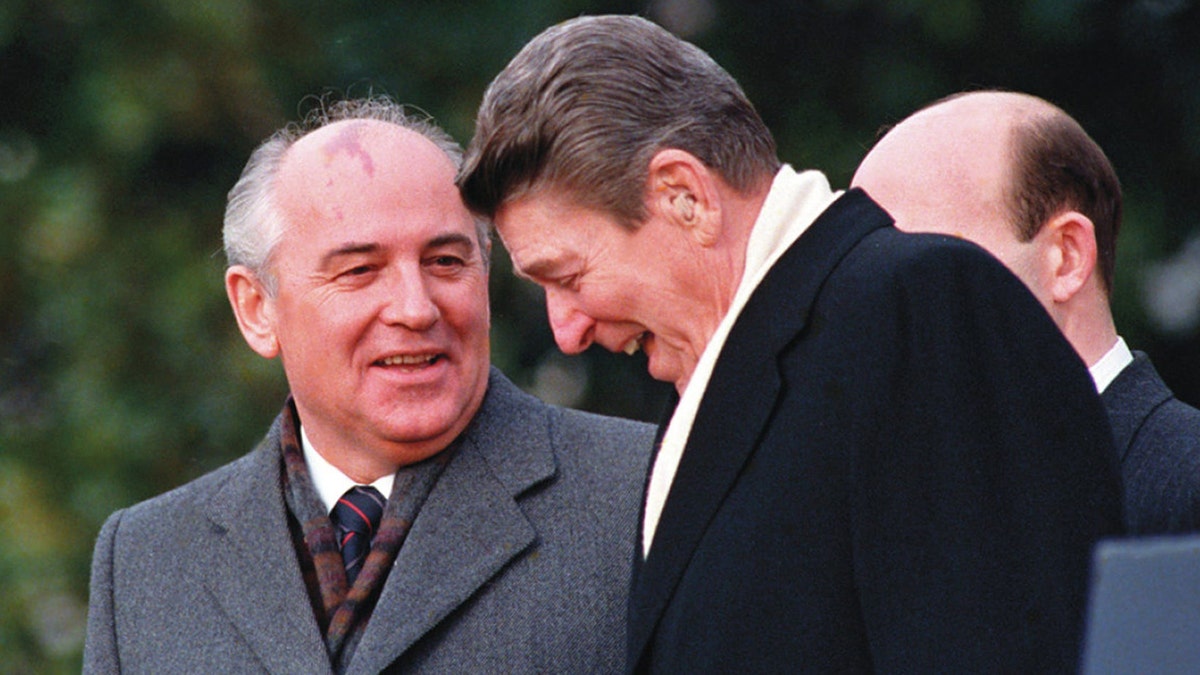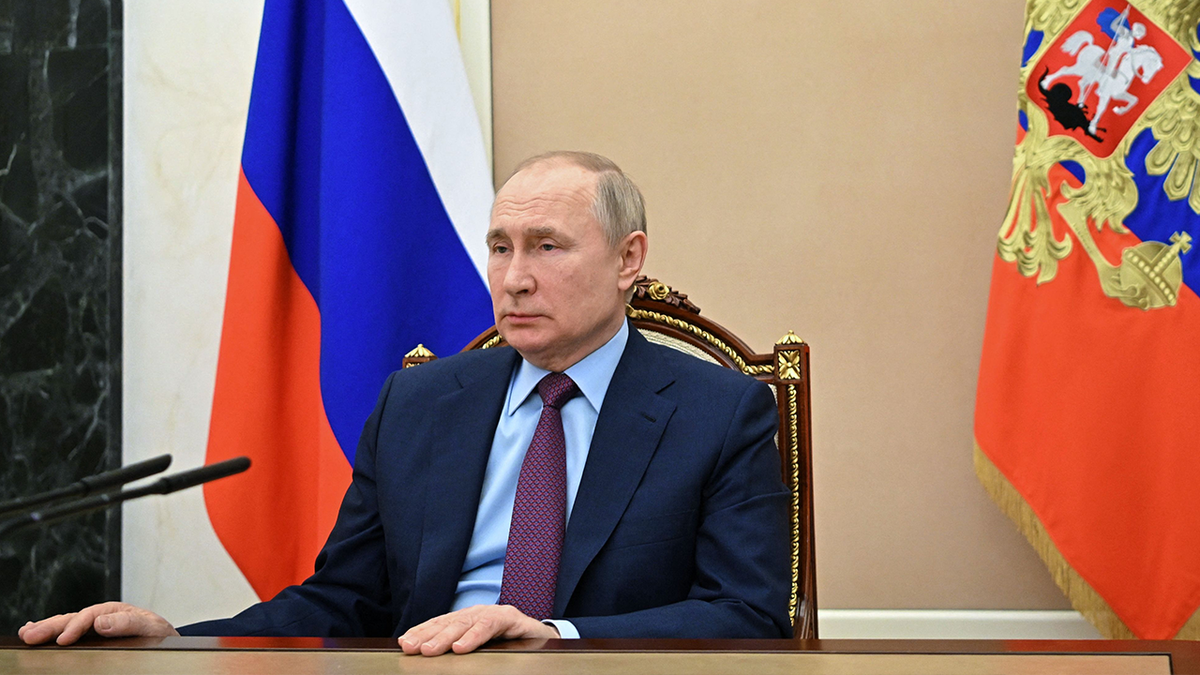Gorbachev’s interpreter speaks on rising Russia tensions since Cold War's end
Interpreter tells Fox News world leaders need to step up to stop Ukraine crisis
MOSCOW – The escalating tension between Russia and Ukraine begs the question of what went wrong. The Cold War ended with such fanfare three decades ago that many people assumed the world would become a better place, at least in terms of geostrategic stability, and many diplomats have been deeply disappointed by the latest developments.
Former Soviet leader Mikhail Gorbachev's interpreter Pavel Palazhchenko is one of them.
He lived through the historic moments leading to the end of the Cold War, side by side with American and Soviet leaders, carefully relaying their messages. Palazhchenko told Fox News he hoped that all wouldn't be lost, and that its spirit and lessons could come to mind in this time of crisis. While he admitted much of the legacy left by former President Reagan and Gorbachev has eroded, something "is still with us," he said.
"We still have this experience of two nations that are very widely apart on many issues working together to address some of the challenges that the world is facing today," Palazhchenko continued. "Some of those challenges were present 30 or 40 years ago, but some are new and there will be new ones. Without Russia and the United States, and I would add China and Europe, working on those challenges anew, the world will be in an extremely difficult place," he noted.

Soviet leader Mikhail Gorbachev with President Ronald Reagan. (AP, File)
Fox News asked Palazhchenko what it was like to work for Gorbachev. "I enjoyed working for him even though it wasn't all roses," he said, explaining how the process of getting to the end of the Cold War was, unsurprisingly, very difficult. "But, I was very proud that we succeeded. I was very proud that in 1988, when President Reagan was in Moscow, standing near the Tsar Cannon and [someone] asked whether he still considered the Soviet Union an evil empire, he said no. It was another time, another era. That was one of the highlights," the interpreter said.
Palazhchenko's career also included work with President George H.W. Bush, who was the one actually in office when the Cold War officially ended. The interpreter said he particularly enjoyed watching the relationship between Reagan and Gorbachev evolve. When asked if he ever saw harsh rhetoric between the two sides on the level it's seen today, he said maybe not personally, but he heard Reagan talk tough to Gorbachev.
"I was present during that difficult beginning when Reagan started out a one-on-one talk calling out Marxism-Leninism, criticizing the Marxist-Leninist dogma, saying it sowed enmity and class struggle around the world and went on with that diatribe for several minutes," Palazhchenko said.
Still, he added that Gorbachev ultimately found his in. "He was happy that Reagan said we need arms reduction rather than arms control and they started talking in [Reykjavík, Iceland] about a world without nuclear weapons," Palazhchenko said. "It was very perceptive of Gorbachev to recognize Reagan's aversion to nuclear weapons. On many issues, they were poles apart, but Gorbachev came to believe that Reagan was for real in his rejection of nuclear weapons and Gorbachev said, ‘This is what we share. We can make it work.’"
CLICK FOR LIVE UPDATES ON RUSSIA-UKRAINE CRISIS
He repeated, "Those were the highlights of my career, and I don't know if in my lifetime I will see a return to these goals and the two nations working toward these goals, but I would love to see it happen."
Palazhchenko, who has been keeping busy at the Gorbachev Center and has himself put out a recent paper on reducing military risks in Europe, said he believed there's a diplomatic solution to everything. He did assert that the state of relations between the West and Russia has come from mutual disappointment borne out of too many illusions both sides held about how life together and apart would be after the Cold War.
The West, Palazhchenko said, has too long ignored Russia's security concerns, and hence failed to understand the mindset or the psychology of Russia. "That does have an effect," he said. "We are all human beings. Russian leaders are human beings, and so when they, time and again, raise the of NATO enlargement and the process relentlessly continues, it does cause resentment."
Of course, there's a strong chorus of voices calling NATO expansion a "red herring" and an excuse to go for the real prize, Ukraine, that President Vladimir Putin simply wants at all costs to take.
Palazhchenko said Gorbachev has been disturbed by how this was going. He said the former Soviet leader always felt that if Russia and Ukraine were separated, there would be trouble, but not necessarily of this kind. "He always warned things could happen that could be very dangerous between Russia and Ukraine, but he always did what he could in order to bring those two nations closer together rather than see a continuation of this rift that we now see widening. So for him, emotionally, it is very tragic," Palazhchenko told Fox News.

Russian President Vladimir Putin at the Kremlin in Moscow on Feb. 14. (ALEXEI NIKOLSKY/Sputnik/AFP via Getty Images, File)
And, it's tragic for all those families divided over this standoff.
Palazhchenko said that he thought the "megaphone diplomacy" of the current moment might need to come down a notch, and that some quieter work would be more effective. But the United States, for its part, having been caught flat-footed when Russia snatched Crimea in 2014, has made a strategic decision to try to call Russia out on transgressions before they happen. Time will tell if that has its intended effect or causes Russia to dig further in. For now, the estimated 150,000 Russian soldiers menacing Ukraine don't seem to be going anywhere, and many ordinary people from Kyiv to Kharkiv to Moscow are very worried about what comes next.
CLICK HERE TO GET THE FOX NEWS APP
Palazhchenko told Fox News the Cold War ended in part because it may have been almost predestined, or because it ran its own course, but much of its conclusion was personality-driven.
"We need the leaders today to step up to their responsibilities," he said. "If they start the process of disentangling this mess that we are seeing, they will have the support of the Russian and American people."










































